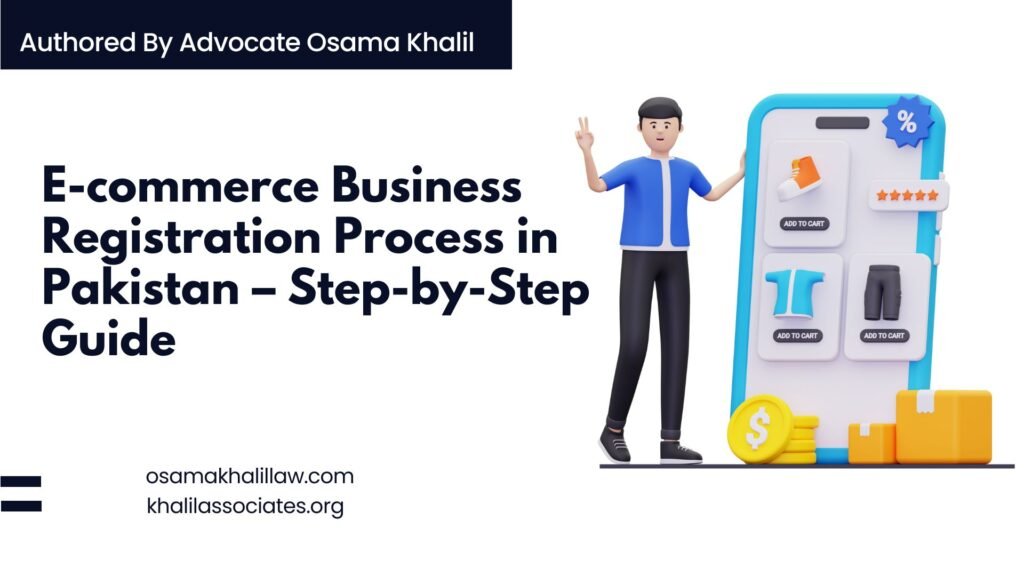
Starting an e-commerce business in Pakistan requires proper registration to operate legally. Many people avoid this step because they think the process is complicated, but in reality, it is straightforward if you follow the right steps. This guide will explain the e-commerce registration process in the simplest way so that even a beginner can understand.
Why is E-commerce Registration Important?
Before diving into the online business registration steps, you must know why registering your e-commerce business matters. First, it makes your business legal and trustworthy. Second, banks and payment gateways require proper documentation. Third, you avoid legal penalties by following government rules.
Types of E-commerce Business Structures in Pakistan
When registering your digital business setup, you must choose a business structure. The most common types include:
Sole Proprietorship
A sole proprietorship is the simplest form where one person owns the business. You do not need extensive paperwork, but your liability remains unlimited.
Private Limited Company
A private limited company provides limited liability protection. You need at least two directors and shareholders, and the registration process is more detailed.
Partnership Firm
If you start an e-commerce business with a partner, a partnership firm is suitable. You must draft a partnership agreement and register it with the relevant authorities.
Step-by-Step E-commerce Registration Process
Now, let’s break down the e-commerce legalization process into simple steps.
Step 1: Choose a Business Name
First, select a unique name for your online store registration. Make sure it is not already registered by another business. You can check name availability on the Securities and Exchange Commission of Pakistan (SECP) website.
Step 2: Register with SECP (For Companies)
If you choose a private limited company structure, you must register with SECP. Submit the required documents, including CNIC copies, business address proof, and nominee details. The process is online, making it convenient.
Step 3: Obtain a National Tax Number (NTN)
Next, apply for an NTN from the Federal Board of Revenue (FBR). This number is essential for tax purposes. You can register online via the FBR’s Iris portal or visit a tax office.
Step 4: Register for Sales Tax (If Applicable)
If your annual turnover exceeds a certain limit, you must register for sales tax. This step ensures compliance with tax laws and avoids penalties.
Step 5: Open a Business Bank Account
After completing the e-commerce registration, open a business bank account. Submit your company registration documents, NTN certificate, and other required papers to the bank.
Step 6: Register with the Pakistan Software Export Board (PSEB) (Optional)
If your e-commerce business involves IT services, registering with PSEB provides additional benefits like tax exemptions and export facilitation.
Step 7: Secure an E-commerce Payment Gateway
To accept online payments, integrate a payment gateway like JazzCash, EasyPaisa, or Stripe. Most payment providers require business registration proof before approval.
Common Challenges in E-commerce Registration
Many entrepreneurs face difficulties during the online business registration process. Some common issues include unclear documentation requirements, delays in approvals, and confusion about tax obligations. However, following this guide will help you avoid these problems.
Cost of E-commerce Registration in Pakistan
The cost varies depending on your business structure. A sole proprietorship is the cheapest, while a private limited company involves higher fees. Additionally, tax registration and legal consultations may add to the expenses.
Post-Registration Requirements
After completing the e-commerce legalization, you must maintain compliance. File annual tax returns, renew licenses if required, and keep business records updated.
Conclusion
The e-commerce registration process in Pakistan is simple if you follow the right steps. From choosing a business name to registering with SECP and FBR, each step ensures your online business operates legally. By completing the digital business setup correctly, you gain credibility, avoid fines, and build trust with customers. Start your online store registration today and grow your e-commerce business successfully!
Legal Assistance for Business Matters
For professional legal guidance and support in immigration matters, you may contact:
Mr. Osama Khalil
Lawyer & Legal Consultant
📞 Phone: 0316-1829946
📧 Email: contact@osamakhalillaw.com | contact@khalilassociates.org
